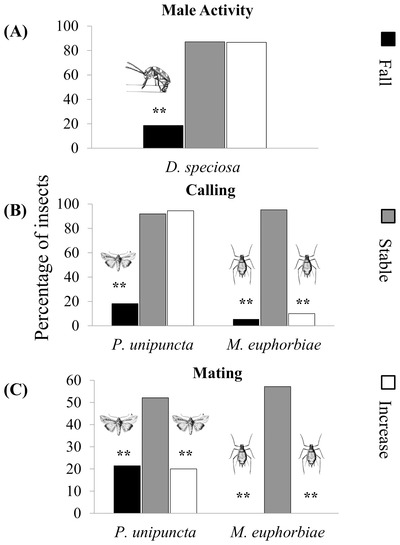Insect weathermen reduce mating activity before storms
Thursday, 03 October, 2013
Researchers from the University of São Paulo have found that insects modify their mating behaviour in response to the changes in air pressure which precede a storm. By reducing mating during wind and rain, it is suggested that the insects are also reducing their risk of injury or death.
In a study published in the journal PLOS ONE, the researchers noted that while light rain and wind can be beneficial to insect populations, “the heavy rains and strong winds associated with storms are potentially important mortality factors” for the small, fragile creatures. They said the ability to detect changes in weather conditions would thus be beneficial, and there is “some evidence that insects adjust their behaviours associated with flight, mating and foraging in response to changes in barometric pressure”.
The researchers chose to study the mating behaviour of three different insects - the curcurbit beetle (Diabrotica speciosa), the true armyworm moth (Pseudaletia unipuncta) and the potato aphid (Macrosiphum euphorbiae) - under falling, stable and increasing air pressure conditions.
Male curcurbit beetles, responding to an extract of the female sex pheromone in a glass Y-tube olfactometer, were found to have lower locomotory activity when pressure decreased compared to stable or increasing pressure conditions. The researchers said, “The proportion of active beetles that selected the arm containing the female sex pheromone were 68, 62 and 85% under falling, stable and rising pressure conditions, respectively.”

Furthermore, when placed in close proximity to females the male beetles’ courtship periods were significantly shorter under falling atmospheric pressure. “Under declining pressure conditions,” the researcher said, “16/26 (63%) of the males immediately mounted the female without any intermediate courtship behaviours, while all males under stable conditions (18/18) exhibited pre-copulatory behaviours such as antennation.”
Armyworm female calling behaviour decreased as the pressure did, while the species’ mating behaviour was negatively affected by rises in pressure as well as falls. The potato aphids were similarly affected, with both calling and mating significantly decreasing when air pressure rose or fell.
The researchers suggest that the changes in behaviour, “especially under decreasing barometric pressure, would reduce the probability of injury or death under adverse weather conditions”. It is said that a rise in pressure facilitates long-distance dispersal for beetles, hence the male’s lack of behavioural change. Where the male armyworms’ behaviour decreased with rising pressure, it was explained their responsiveness to female pheromone decreases with increasing wind speed. Furthermore, male aphids are particularly poor at flying and would try to avoid exposure to wind.
The researchers recognise that there were also interspecific differences related to size, flight ability and the diel periodicity of mating activity, and encourage further studies in the area.
What journalists expect from the scientists they speak to
Peer review is often treated as the end of the story, but for journalists it is usually the point...
European Space Agency inaugurates deep space antenna in WA
The ESA has expanded its capability to communicate with scientific, exploration and space safety...
Black hole collision supports Hawking's landmark theory
Astrophysicists have witnessed a collision between two black holes that was so loud, they were...



